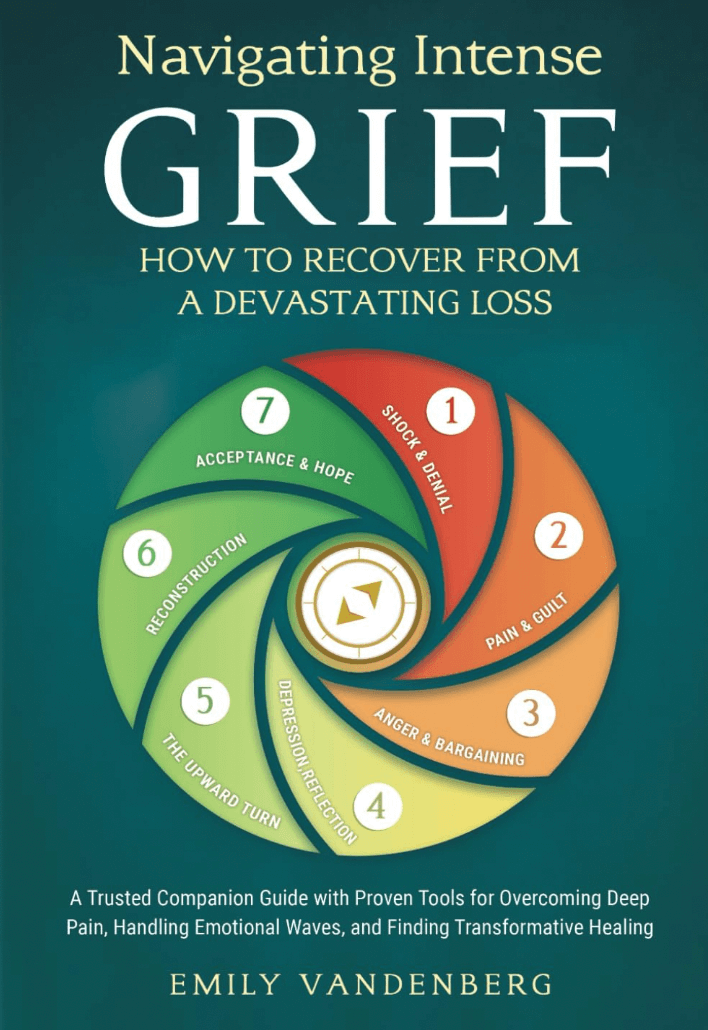30 Better Ways to Say “Sorry for Your Loss” (That Actually Offer Comfort)
When someone we care about is grieving, we often find ourselves at a loss for words. The phrase “Sorry for your loss” is the most common way to express sympathy, but sometimes it can feel generic, impersonal, or even inadequate in truly conveying support.
If you want to say something more meaningful, personal, and comforting, this list of 30 alternative phrases can help you express your condolences in a way that truly supports the grieving person.

This post contains affiliate links. I may earn a small commission, at no extra cost t you.


Why “Sorry for Your Loss” Isn’t Always Enough
While there’s nothing wrong with saying “sorry for your loss,” it can sometimes:
✔ Feel automatic or distant (especially if you don’t follow it with anything else).
✔ Not acknowledge the unique relationship between the grieving person and their loved one.
✔ Make the conversation feel one-sided, where the person receiving it doesn’t feel invited to share more.
By choosing a more thoughtful or personal approach, you can offer deeper comfort and connection during a difficult time.
30 Meaningful Alternatives to “Sorry for Your Loss”
1. Acknowledge Their Pain in a Personal Way
Instead of a generic response, recognize their grief with sincerity.
- “I can’t begin to imagine how painful this is for you, but I want you to know I’m here for you.”
- “My heart aches for you during this time. I’m so sorry.”
- “I know how much [Name] meant to you, and I’m truly sorry you’re going through this.”
2. Offer Specific Support
Rather than just acknowledging the loss, provide a tangible offer of help.
- “I’m so sorry for your loss. Can I bring you dinner or help with anything this week?”
- “Please know that I’m here to listen whenever you feel like talking.”
- “I’d love to help with [specific task] if you need me.”
3. Recognize Their Loved One’s Impact
Help them remember how special their loved one was.
- “I’ll always remember how kind and generous [Name] was.”
- “The world was better because [Name] was in it.”
- “I feel so lucky to have known [Name]. Their warmth and kindness touched so many.”
4. Use a Gentle Faith-Based Message (If Appropriate)
For someone with faith, words of spiritual encouragement can bring comfort.
- “I’m praying for you and your family during this difficult time.”
- “May God wrap you in His love and bring you peace.”
- “I hope you find comfort in knowing that [Name] is at peace.”
5. Express That You Miss Their Loved One Too
This is especially helpful if you knew the person who passed away.
- “I miss [Name] so much. They were truly one of a kind.”
- “I’ll always cherish my memories with [Name].”
- “I feel honored to have known [Name], and my heart is with you.”

6. Acknowledge That Grief is Hard
Instead of rushing them to feel better, validate their feelings.
- “There’s no right or wrong way to grieve. However you’re feeling is okay.”
- “This is so hard, and I just want you to know I see your pain.”
- “Grief is a long journey. Take your time, and know I’m here when you need me.”
7. If You Don’t Know What to Say, Say That (It’s Okay!)
Sometimes, the most honest thing to say is that you don’t have the perfect words.
- “I don’t know what to say, but please know I’m here for you.”
- “I wish I had the right words, but I just want you to know I care.”
- “I can’t take away your pain, but I hope you feel surrounded by love.”
What to Avoid Saying
Even with the best intentions, some phrases can be unintentionally hurtful. Here are a few things to avoid:
🚫 “At least they lived a long life.” (Minimizing grief never helps.)
🚫 “Everything happens for a reason.” (This can feel dismissive and insensitive.)
🚫 “I know exactly how you feel.” (Everyone grieves differently.)
🚫 “They wouldn’t want you to be sad.” (They may not be able to control their emotions, and that’s okay.)
🚫 “Time heals all wounds.” (Healing is personal and different for everyone.)

How to Offer Comfort Beyond Words
Saying the right thing is important, but actions can speak even louder than words. If you truly want to support someone who is grieving, consider going beyond verbal condolences with one of these thoughtful gestures:
1. Show Up and Be Present
Sometimes, the best way to help is simply to be there. Whether it’s sitting in silence, offering a hug, or listening when they’re ready to talk, your presence can be a powerful source of comfort.
💡 How to Help:
✔ Offer to stop by for a short visit—no pressure, just presence.
✔ Let them know they don’t have to entertain you. Just sit with them if they need company.
✔ If they prefer solitude, check in with a simple text: “No need to reply, just wanted to remind you I’m here for you.”
2. Send a Thoughtful Note or Card
A handwritten letter can provide lasting comfort in ways that spoken words sometimes can’t.
💌 What to Write in a Sympathy Card:
✔ Share a specific memory of their loved one (“I’ll never forget how [Name] always made us laugh.”)
✔ Offer gentle reassurance (“Take all the time you need. You are surrounded by love.”)
✔ Keep it simple and heartfelt (“I’m holding you in my thoughts and prayers.”)
💡 Tip: Consider mailing a card weeks or months later, when the initial flood of condolences has slowed. Grief lasts much longer than the immediate days after a loss.
3. Deliver a Meal (or Set Up a Meal Train)
Grief can be overwhelming, and even basic tasks like cooking or grocery shopping can feel impossible. Bringing a homemade meal or organizing a meal train can be a huge relief.
🍲 How to Help:
✔ Ask about dietary restrictions before bringing food.
✔ Opt for easy-to-heat meals like soups, casseroles, or slow-cooked dishes.
✔ If they aren’t up for visitors, drop it off with a note: “No need to come to the door—just wanted you to have something warm to eat.”
💡 Tip: If cooking isn’t your thing, send a food delivery gift card so they can order what they need.
4. Help with Daily Tasks & Errands
Grief can make even small tasks feel exhausting. Offer to help with things they might be struggling with.
✔ Offer to run errands, like picking up groceries or prescriptions.
✔ Help with housework—doing dishes, folding laundry, or walking their dog.
✔ If they have kids, offer childcare so they can have space to process their emotions.

💡 How to Offer Help Without Being Overwhelming:
Instead of saying, “Let me know if you need anything,” try:
- “Can I pick up groceries for you this week?”
- “I’d love to walk your dog for you tomorrow. Would that be okay?”
- “I’m stopping by the coffee shop—can I bring you a coffee?”
Being specific makes it easier for them to accept help.
5. Remember Important Dates
Grief doesn’t disappear after the funeral—it lingers for months and years. One of the most meaningful things you can do is remember anniversaries, birthdays, and special dates that might be difficult for them.
📅 Ways to Show Support on Difficult Days:
✔ Send a text or card on the anniversary of their loved one’s passing.
✔ If you were close to the person who passed, light a candle or say a prayer in their honor.
✔ Offer to spend time together—a simple coffee date can mean a lot.
💡 What to Say:
- “Thinking of you today. I know this date is tough, and I’m here if you need anything.”
- “I just wanted to check in. I remember how special [Name] was, and I’m holding you in my thoughts today.”
6. Share a Memory
One of the greatest fears people have after losing a loved one is that they will be forgotten. If you knew the person who passed away, sharing a memory can be a beautiful gift.
💬 Ways to Share:
✔ Tell them about a funny or meaningful moment you had with their loved one.
✔ Share an old photo or video and write a short note about why it’s special.
✔ If you post on social media, tag them and write a tribute.
💡 Example Message:
“I was just thinking about [Name] today and remembering the time they [funny or heartfelt memory]. They brought so much joy to everyone around them. I hope this memory makes you smile today.”
7. Be Patient and Available—Even Months Later
Grief doesn’t have an expiration date. Many people receive a flood of support in the first few weeks after a loss, but as time passes, they may feel more alone in their pain.
⏳ How to Show Long-Term Support:
✔ Check in months later with a simple, “How are you doing? I’m here if you want to talk.”
✔ Invite them to social gatherings, but don’t pressure them if they aren’t ready.
✔ Respect their grieving process—everyone heals differently, and some days are harder than others.
💡 If They Don’t Respond:
It’s okay! Keep reaching out in small ways. Even if they don’t reply, they’ll appreciate knowing someone cares.

✅ What to Say Instead of “Sorry for Your Loss”: A Quick Checklist
If you want to offer true comfort to someone grieving, use these alternative phrases that feel more personal and meaningful.
💬 Acknowledge Their Grief & Offer Sympathy
✔ “I can’t begin to imagine how hard this must be for you, but I want you to know I’m here.”
✔ “My heart aches for you. I’m so sorry you’re going through this.”
✔ “I know how much [Name] meant to you, and I’m truly sorry for your loss.”

🤲 Offer Specific Support
✔ “I’d love to help with [specific task]—would that be okay?”
✔ “Can I bring you dinner or run an errand for you this week?”
✔ “I’m here to listen whenever you feel like talking—no pressure at all.”
📖 Recognize Their Loved One’s Impact
✔ “I’ll always remember how kind and generous [Name] was.”
✔ “The world was better because [Name] was in it.”
✔ “I feel so lucky to have known [Name]. Their warmth and kindness touched so many lives.”
🙏 Faith-Based Comfort (If Appropriate)
✔ “I’m praying for you and your family during this difficult time.”
✔ “May God wrap you in His love and bring you peace.”
✔ “I hope you find comfort in knowing that [Name] is at peace.”
🕊️ Express That You Miss Their Loved One Too
✔ “I miss [Name] so much. They were truly one of a kind.”
✔ “I’ll always cherish my memories with [Name].”
✔ “I feel honored to have known [Name], and my heart is with you.”
Validate Their Feelings Without Rushing Their Grief
✔ “There’s no right or wrong way to grieve. However you’re feeling is okay.”
✔ “This is so hard, and I just want you to know I see your pain.”
✔ “Grief is a long journey. Take your time, and know I’m here when you need me.”
🤷 If You Don’t Know What to Say, Say That (It’s Okay!)
✔ “I don’t know what to say, but please know I’m here for you.”
✔ “I wish I had the right words, but I just want you to know I care.”
✔ “I can’t take away your pain, but I hope you feel surrounded by love.”
💡 Pro Tip: Follow up weeks or months later with a simple check-in:
✔ “I just wanted to see how you’re doing today.”
✔ “I know grief doesn’t go away overnight, and I’m still here for you.”

By using any of these thoughtful alternatives, you’ll show genuine support—which means far more than just saying “sorry for your loss.”
Table: Alternative Phrases to “Sorry for Your Loss”
| Category | Alternative Phrases |
|---|---|
| 💬 Acknowledge Their Grief & Offer Sympathy | – “I can’t begin to imagine how hard this must be for you, but I want you to know I’m here.” – “My heart aches for you. I’m so sorry you’re going through this.” – “I know how much [Name] meant to you, and I’m truly sorry for your loss.” |
| 🤲 Offer Specific Support | – “I’d love to help with [specific task]—would that be okay?” – “Can I bring you dinner or run an errand for you this week?” – “I’m here to listen whenever you feel like talking—no pressure at all.” |
| 📖 Recognize Their Loved One’s Impact | – “I’ll always remember how kind and generous [Name] was.” – “The world was better because [Name] was in it.” – “I feel so lucky to have known [Name]. Their warmth and kindness touched so many lives.” |
| 🙏 Faith-Based Comfort (If Appropriate) | – “I’m praying for you and your family during this difficult time.” – “May God wrap you in His love and bring you peace.” – “I hope you find comfort in knowing that [Name] is at peace.” |
| 🕊️ Express That You Miss Their Loved One Too | – “I miss [Name] so much. They were truly one of a kind.” – “I’ll always cherish my memories with [Name].” – “I feel honored to have known [Name], and my heart is with you.” |
| Validate Their Feelings Without Rushing Their Grief | – “There’s no right or wrong way to grieve. However you’re feeling is okay.” – “This is so hard, and I just want you to know I see your pain.” – “Grief is a long journey. Take your time, and know I’m here when you need me.” |
| 🤷 If You Don’t Know What to Say, Say That (It’s Okay!) | – “I don’t know what to say, but please know I’m here for you.” – “I wish I had the right words, but I just want you to know I care.” – “I can’t take away your pain, but I hope you feel surrounded by love.” |
💡 Bonus Tip: Follow up weeks or months later with a check-in like:
✔ “I just wanted to see how you’re doing today.”
✔ “I know grief doesn’t go away overnight, and I’m still here for you.”
The Power of Genuine Support
Losing someone is one of the hardest experiences a person can go through, and while no words can take away their pain, your kindness and presence can make a difference.
✔ Speak from the heart. Even if it’s simple, your words matter.
✔ Show up in tangible ways. Actions often mean more than words.
✔ Keep checking in. Grief lasts beyond the first few weeks.
Speak from the Heart
No words can take away the pain of loss, but a thoughtful, sincere message can offer comfort and remind someone they’re not alone. Whether you share a memory, offer support, or simply acknowledge their grief, what matters most is being there in a way that feels genuine.
